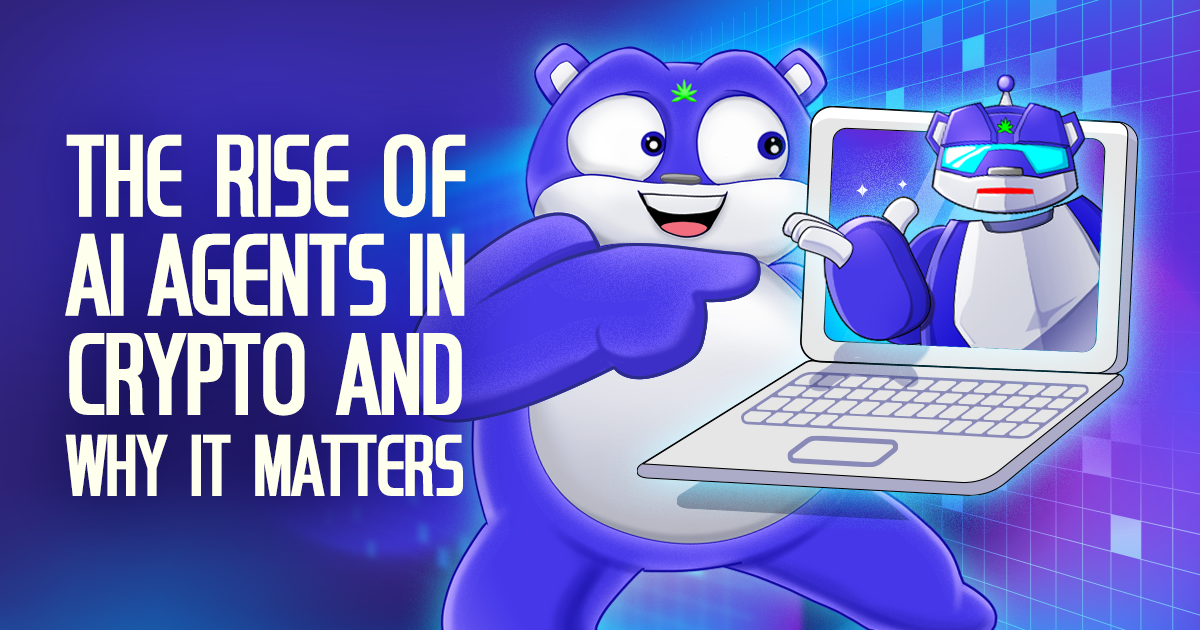The Rise of AI Agents in Crypto and Why It Matters

The convergence of artificial intelligence (AI) and blockchain technology is welcoming a new era of onchain intelligence, where autonomous systems are transforming how users interact with decentralised finance (DeFi), trading, and governance. At the forefront of this shift are AI agents, which are sophisticated autonomous programs that analyse data, make decisions, and execute actions on blockchain networks with minimal human oversight. While these agents are gaining momentum across various ecosystems, Coinbase’s Layer 2 solution, Base, is emerging as a hub for AI-driven innovation.
This article explores the rise of AI agents in crypto, their applications, and their potential to redefine user experiences and protocol design. We also examine how AI agents are bridging the gap between complex DeFi strategies and accessible, automated solutions.
Key Takeaways
AI agents are driving a new era of onchain intelligence, evolving beyond simple bots into systems that learn, reason, and act on their own. They are making DeFi strategies more accessible and automated.
As DeFi grows more complex, AI automation is stepping in. Agents now handle yield optimisation, portfolio rebalancing, and decentralized autonomous organization (DAO) voting, reducing the need for constant user involvement.
Base is becoming a hub for these innovations. Its low fees, scalability, and developer-friendly design make it ideal for agents that execute frequent onchain tasks.
Prodigy.Fi, live on Base, offers structured Dual Currency Investment (DCI) vaults built for yield and risk management. While not AI-powered yet, the platform may just be well-suited for agents that could analyse markets, optimise returns, and rebalance in real time.
As the DeFAI market grows, embracing interoperability, smart wallets, and intent-driven systems will be key. Done right, this unlocks safer, smarter, and more inclusive tools for the next wave of onchain users.
The New Era of Onchain Intelligence
AI agents in the Web3 and DeFi ecosystem are autonomous programs that leverage machine learning, data analytics, and blockchain integration to perform tasks such as trading, portfolio management, onchain research, and even protocol governance. Unlike traditional bots that follow rigid, pre-programmed rules, AI agents adapt to dynamic market conditions, learn from outcomes, and refine their strategies in real time. Their emergence in crypto builds on the broader AI boom that followed ChatGPT, with advancements in large language models (LLMs) and decentralized infrastructure fueling new interest in onchain automation.
The crypto market is a 24/7, data-rich environment, making it an ideal playground for AI agents. As DeFi protocols become increasingly complex, manual strategies are proving inadequate, pushing users toward automation to manage liquidity, optimise yields, and navigate cross-chain opportunities. According to CoinGecko, the market cap for AI agent-related tokens reached $15 billion by the end of 2024, surging 222% in Q4 alone.
Base is carving out a niche as a center for AI agents, thanks to its low-cost infrastructure and developer-focused tools. Posts on X highlight Base’s ambition to onboard 25 million users and 25,000 developers by 2025, with AI agents positioned as a critical part of that vision.
AI Agents 101: From Scripts to Self-Execution
AI agents stand apart from traditional bots and smart contracts in their ability to reason, learn, and act autonomously within defined parameters. While smart contracts execute fixed logic on blockchains and bots carry out scripted tasks, AI agents merge onchain execution with off-chain machine learning to adapt to shifting conditions. For instance, an AI agent might analyse market trends, assess risk, and execute trades across decentralised exchanges (DEXs) — all without human intervention.
Types of AI Agents in Trading and DeFi:
- Execution Agents: Automate trades, arbitrage, or liquidity provisioning on platforms like Uniswap or Aave.
- Portfolio Managers: Rebalance assets in response to market shifts, risk profiles, or yield optimisation targets.
- Governance Bots: analyse proposals and vote in DAOs.
- Intent-Based Actors: Interpret user directives (eg, “maximise my yield”) and execute complex, multi-step strategies.
Understanding the distinction between off-chain LLMs and onchain logic is key. Off-chain LLMs, like those behind ChatGPT, process massive datasets to generate insights or predictions. Onchain logic, meanwhile, allows agents to interact directly with blockchain protocols, executing transactions and managing smart contracts. Solana’s ChatGPT plugin highlights this hybrid model, enabling users to query blockchain data or perform actions through natural language prompts.
AI Agents in Action: What’s Live Today
AI agents are already reshaping the crypto landscape. Notable examples include:
- Autonolas (Olas): A blockchain-agnostic platform for autonomous agents, Olas has processed over 3.5 million transactions across nine chains, including 2 million agent-to-agent interactions. Its Pearl agent app store enables non-developers to deploy agents for DeFi trading or even social automation.
- Sentient: A decentralised, community-governed AI platform focused on AGI and loyalty systems, recently raising $85M to advance its ecosystem.
- Morpheus: A decentralized AI compute network enabling peer-to-peer sharing of resources to run advanced models
- ChainGPT: Through its AI Virtual Machine (AIVM), it lets developers deploy AI agents for DeFi automation, from yield strategies to research.
These agents simplify complex tasks. Portfolio managers, for example, monitor onchain and offchain signals, rebalance holdings, and optimise yields across platforms like Aave or Compound. Governance bots scan DAO proposals and vote based on pre-set rules, streamlining decentralized decision-making.
Interface-layer agents, such as AutoGPT for crypto, are also on the rise. These function like conversational assistants, guiding users through DeFi protocols or executing trades via simple prompts. On X, users have spotlighted new AI wallets, with Coinbase’s Based Agent letting users spin up full onchain AI agents in under three minutes.
Spotlight on Base: The AI Agent Playground

Base is quickly becoming a hub for AI agents, thanks to its low-cost, scalable infrastructure and developer-friendly ecosystem. With low transaction fees, Base is perfect for agents that need to execute frequent onchain operations.
AI-Focused Projects on Base
- Freysa.ai: A sovereign AI agent platform that integrates with Base for USDC payments and onchain games, exploring innovative agent-human interactions.
- Heyanon.ai: An AI-driven trading assistant that manages portfolios with intent-based execution, using Base’s infrastructure for seamless onchain transactions.
- OtoCo: Lets AI agents create and manage onchain LLCs, hinting at Base’s real-world application potential.
- Virtuals Protocol (AIXBT): Via its G.A.M.E platform, Virtuals allows users to create and co-own AI agents for DeFi and gaming, with its AIXBT token gaining traction since its 2024 launch.
Base’s modular design and interoperability, built on the OP Stack, make it appealing for agent developers. With an ambitious goal of 25 million users by 2025, the ecosystem is set to lead AI-driven crypto adoption.
Opportunities for AI Agents Within Prodigy.Fi
Prodigy.Fi is a DeFi protocol live on Base, offering DCI vaults designed to allow users to earn yield no matter the market direction. While Prodigy.Fi’s DCI vaults are not AI-driven, their structured design makes them an ideal candidate for future integration with AI agents. These vaults, which allow users to invest in dual currency pairs to optimise returns, could benefit from autonomous agents in several ways:
- Yield Optimisation: AI agents could enhance DCI vaults by analysing real-time market data across Base’s ecosystem, adjusting allocations to maximise annual percentage yields (APYs). For example, an agent could assess gas costs, market volatility, and impermanent loss risks to optimise returns on dual currency strategies.
- Automated Rebalancing: Agents could automate the reinvestment of profits or rebalance assets within DCI vaults based on predefined user preferences or market conditions, ensuring consistent performance without manual intervention.
Risks, Ethics, and Regulation of Autonomous Agents
Despite their promise, AI agents bring new risks. Autonomous fund management can lead to unforeseen outcomes, such as flawed trades or exposure to exploits. A stark reminder came with the September 2024 Banana Gun bot exploit, which saw users lose 563 ETH (~$1.9 million) due to an oracle flaw, according to Cointelegraph.
Ethical concerns include algorithmic bias and lack of transparency. If an agent’s decision process is opaque, user trust can erode. Regulators are also paying closer attention, examining AI-powered financial systems for compliance, data privacy, and accountability. Projects like DeFi Agents AI are tackling these challenges through bias mitigation and transparent frameworks.
As the DeFAI market potentially climbs to $20 billion, developers and users must navigate the associated risks and ethical questions to secure a transparent, resilient future. By championing interoperability, programmable wallets, and intent-driven systems, the crypto ecosystem can fully unlock the promise of AI agents, making DeFi smarter, safer, and more inclusive.
More insights, less fluff. Follow to keep learning.
✱ Website: https://prodigy.fi/
✱ Web App: https://mainnet-base.prodigy.fi/earn
✱ X: https://x.com/ProdigyFi
✱ Telegram: http://t.me/@prodigyfi
✱ Discord: https://discord.gg/PBKGN76YDn
✱ Youtube: https://youtube.com/@prodigyfi_official
